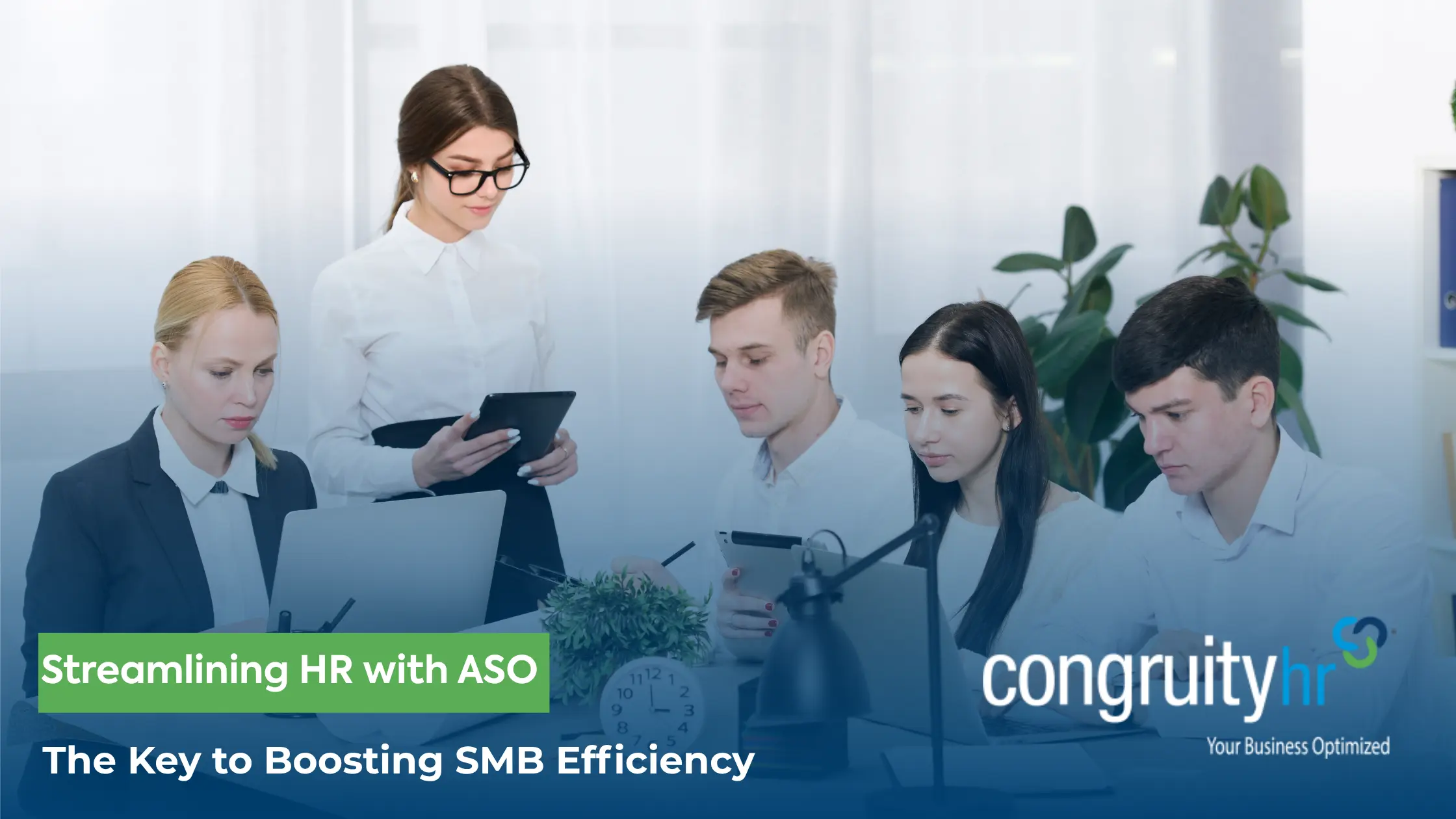Top HR Outsourcing Company Congruity:

Running a small business is rewarding but it can also feel like a juggling act. Between managing clients, meeting deadlines, and growing your team, HR tasks often fall into the “necessary but draining” category. Payroll, compliance filings, and employee paperwork quickly eat into time that should be spent on strategy and service.
And the numbers tell the story. According to the U.S. Small Business Administration, 81% of small businesses operate with just one employee, and those that do have staff average only 11.7 employees. With limited resources, it’s easy for HR to become a time sink. Nearly 68% of small businesses close within two years, often due to operational inefficiencies and compliance mistakes.
So how can owners keep up without burning out?
That’s where Administrative Services Outsourcing (ASO) steps in a smarter, more flexible way to manage HR without giving up control.
If you’ve ever wished you could hand off HR admin work while still steering the ship, that’s exactly what ASO allows you to do.
An Administrative Services Organization (ASO) provides outsourced HR support such as payroll, compliance, benefits administration, and reporting while you remain the official employer of record. This means you stay in control of your employees and your business policies, while experts handle the heavy lifting behind the scenes.
Typical ASO services include:
Payroll management and tax filing
Small business owners often confuse ASO with PEO (Professional Employer Organization) services. Both offer HR support, but the structure and the level of control you keep are very different.
Here’s how they stack up:
| Feature | ASO | PEO |
|---|---|---|
| Employment Relationship | You remain the Employer of Record | Co-employment (shared legal responsibility) |
| Payroll Taxes | Filed under your EIN | Filed under PEO’s EIN |
| Benefits & Workers’ Comp | You choose and own policies | PEO negotiates group plans |
| Pricing Model | Per-employee or flat fee | % of payroll or per-employee |
| Flexibility | Modular and customizable | Bundled service packages |
If you value control, customization, and transparency, ASO is usually the better fit. If you’d rather hand off legal employment responsibilities, a PEO might make sense.
Most small business owners prefer ASO because it keeps their business identity intact while freeing them from administrative overload.
It’s no secret many small businesses operate with thin margins and lean teams. Every hour spent managing timesheets or chasing down paperwork is an hour not spent serving customers or generating revenue.
Here are some common HR challenges U.S. SMBs face:
These pain points are exactly what ASO was built to solve.
Partnering with an ASO transforms HR from a headache into a strategic advantage. Here’s how:
Example:
“One small manufacturing firm partnered with CongruityHR to manage multi-state payroll and compliance. Within three months, the company cut HR admin time by 40% and eliminated costly filing errors.”
Small business owners are practical people. They need to see results—and ASO delivers measurable gains across multiple fronts.
Hiring in-house HR professionals or subscribing to multiple HR software tools adds up quickly. ASO consolidates these services into a single, predictable monthly cost often saving 25–40% compared to in-house HR expenses.
ASO specialists stay on top of federal and state labor laws, including FMLA, OSHA, and ACA requirements. That means fewer fines, audits, or legal risks.
Add services as you grow. Start with payroll, then layer on benefits, compliance, or recruiting support without renegotiating contracts or changing providers.
ASO systems make it easy for employees to access pay stubs, update information, and enroll in benefits creating a professional experience that boosts retention.
Reclaim hours every week by offloading admin tasks. One CongruityHR client reported saving six hours per week, time they now invest in business development.
Pro Tip:
“Multiply your average hourly rate by the hours you spend on HR. That’s your hidden “HR tax.” ASO helps you reclaim those hours.”
Payroll might seem simple, but it’s one of the most error-prone and regulated parts of HR. Here’s how an ASO simplifies it:
By automating payroll, small businesses reduce manual errors and eliminate compliance worries.
Selecting an ASO is like hiring a new business partner. You need reliability, transparency, and expertise. Here’s what to look for:
CongruityHR stands out because of its focus on personalized ASO solutions. With decades of experience helping U.S. SMBs streamline HR, CongruityHR combines cutting-edge technology with real human expertise no call-center runaround.
Making the switch to ASO is simpler than you might think. Here’s a quick roadmap:
Try This:
“Track HR-related hours for one week, then revisit that list after implementing ASO. You’ll be surprised how much time you’ve gained.”
Small business owners didn’t start their companies to manage HR paperwork. They started to build something meaningful and ASO helps them get back to that mission.
By partnering with an experienced provider like CongruityHR, you gain peace of mind knowing your HR operations are compliant, efficient, and scalable. Whether you’re hiring your first employee or managing multiple locations, ASO adapts to your needs and grows with you.
Not exactly. With ASO, you keep full control of your workforce. The ASO handles administrative and compliance tasks behind the scenes.
Payroll, benefits administration, onboarding, compliance, reporting, and risk management are the most common.
Most providers charge a flat monthly per-employee fee or a fixed subscription plan often less expensive than maintaining in-house HR staff.
Yes. ASOs like CongruityHR specialize in managing state-by-state payroll taxes, labor laws, and employment filings.
Those plans apply to self-funded health insurance. ASO for HR focuses on payroll, compliance, and admin support not medical claims.